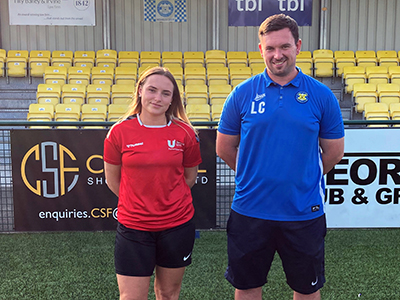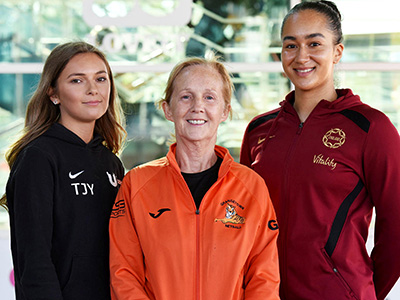Course overview
You develop your research and laboratory skills alongside your abilities in critical thinking, problem solving and reflective practice to enhance your employment potential.
Top reasons to study sport and exercise science
- Career focused: we introduce you to a wide range of employers and help you plan your career from day one, in pathways such as teaching PE, sports coaching, strength and conditioning and personal training, exercise referral, the health and fitness industry and others
- Facilities: cutting-edge equipment and laboratory space gives you the practical skills you need to assess performance in sports and exercise, and includes: an outdoor 3G astro turf, advanced laboratories for fitness testing (VO2 max, blood sampling), technique analysis (3D motion analysis), and strength and conditioning.
- One day a week attendance: your timetabled sessions will take place on one day only enabling you to negotiate your attendance at University with your employers or organise your own time effectively
- Student experience: outside of your studies Teesside Sport offers performance sport scholarship, opportunities to join University and/or campus sport teams; volunteering or working in The Gym and sports facilities.
- Staff expertise: the teaching and technical team have worked with athletes and coaches across youth development programmes, professional and elite sport. Staff hold professional accreditations (BASES and UKSCA), produce internationally-recognised research and advise on the UK government’s guidelines for physical activity.
Course details
Course structure
Core modules
You develop a multi-disciplinary approach to the measurement and analysis of activities from applied sport science. You develop practical data collection techniques from the fields of physiology, psychology and biomechanics alongside evaluating the techniques. You analyse activities from a holistic perspective and prescribe suitable interventions to enhance performance.
Dissertation for Sport and Exercise
You build upon the research skills developed throughout previous study to carry out a research project in an area of interest negotiated with your supervisor. If you choose to work with or collect data from a vulnerable group, a Disclosure and Barring Service (DBS) check will be required, and you are responsible for paying for this.
Methods of Enquiry in Sport and Exercise
You develop your understanding of the methods of enquiry associated with sport and exercise, including research design, reflective practice, ethics, writing research proposals and data analysis. You critically evaluate current literature from an area of sport and exercise that interests you to inform a research proposal in the dissertation module.
Physical Education and School Sport: Providing Opportunities for Physical Activity
All children should have the opportunity to experience high quality physical education, physical activity and sport. Ensuring that all children, including those with complex physical, cognitive and psychological needs have access to sufficient daily physical activity is important for their physical and mental well-being. Physical education is an integral part of the curriculum in most schools and should involve pupils in the continuous process of planning, performing and evaluating in all areas of activity. Children who participate in sport and physical activity should have a quality experience and be given the opportunity to fulfil their potential.
Regular and sufficient physical activity can also improve children’s behaviour, enhance academic achievement and integration. You explore and evaluate sustainable’ strategies to improve children’s health and wellbeing, a key focus of government physical activity strategies.
Physiology and Psychology of Exercise and Health
The benefits of exercise are well documented, but exercise can also be used to enhance societal psychological and physiological health and wellbeing. Using exercise to enhance wellbeing for the individual and society will reap the physical benefits as well as experiencing an overall increase in quality of life. You consider a range of topics related to mental and subjective well-being will be explored as well as examining the efficacy of various public health promotion campaigns.
Modules offered may vary.
How you learn
Modules are delivered on one whole day (morning and afternoon, currently Thursday) for both full-time and part-time students. You experience a range of learning and teaching methods including lectures, seminars, weekend workshops, laboratory sessions, problem-based learning, reflective practice and independent research.
The programme is structured to move from a tutor led focus in the first term to independent study in the later stages of the programme.
How you are assessed
A variety of assessments are used throughout the programme to ensure you have a range of opportunities to demonstrate your learning. Assessment includes a strategy report, oral presentation, poster presentation, journal style article, research proposal and scientific report with reflection.
Timetabling information
A variety of assessments are used throughout the programme to ensure you have a range of opportunities to demonstrate your learning. Assessment includes a strategy report, oral presentation, poster presentation, journal style article, research proposal and scientific report with reflection.
Our Disability Services team provide an inclusive and empowering learning environment and have specialist staff to support disabled students access any additional tailored resources needed. If you have a specific learning difficulty, mental health condition, autism, sensory impairment, chronic health condition or any other disability please contact a Disability Services as early as possible.
Find out more about our disability services
Find out more about financial support
Find out more about our course related costs
Entry requirements
Entry requirements
Successful completion of a foundation degree (or other relevant level 5 qualification) in a sport and exercise related discipline.
You must also hold GCSE English language and maths at grade 4 (grade C) or above (level 2 literacy and numeracy qualifications are also accepted).
For general information please see our overview of entry requirements.
International applicants can find out what qualifications they need by visiting Your Country.
You can gain considerable knowledge from work, volunteering and life. Under recognition of prior learning (RPL) you may be awarded credit for this which can be credited towards the course you want to study.
Find out more about RPL
Employability
Career opportunities
A core objective of the degree is to equip you with a range of skills, competencies and knowledge for embarking on a successful career. It is important to recognise the broad range of professional roles and industries related to the field of sport and exercise science.
Examples of these roles include:
- secondary school PE teacher
- primary school teacher
- exercise referral specialist
- sports development officer
- head coach
- performance analyst
- health promotion specialist
- researcher
- lecturer
- manager, through a graduate scheme
- outdoor adventure coach
- clinical cardiac physiologist
- high-performance physiologist
- biomechanist
- sport scientist
- fitness instructor or personal trainer
- strength and conditioning coach
- owner of a lifestyle business
Please follow these links to job roles:
The British Association of Sport and Exercise Sciences
Chartered Institute for the Management of Sport and Physical Activity
According to the Physiological Society’s 2019 report, ‘Sport & Exercise Science Education: Impact on the UK Economy’:
• sport and exercise science courses add £3.9 billion in income to the UK economy
• average salaries for sport and exercise science graduates after six months of employment are £21,100 a year
• over the course of their careers, sport and exercise science graduates earn on average £667,000 more compared to their non-graduate peers.
Find out more
Information for international applicants
Qualifications
International applicants - find out what qualifications you need by selecting your country below.
Select your country:
Useful information
Visit our international pages for useful information for non-UK students and applicants.



